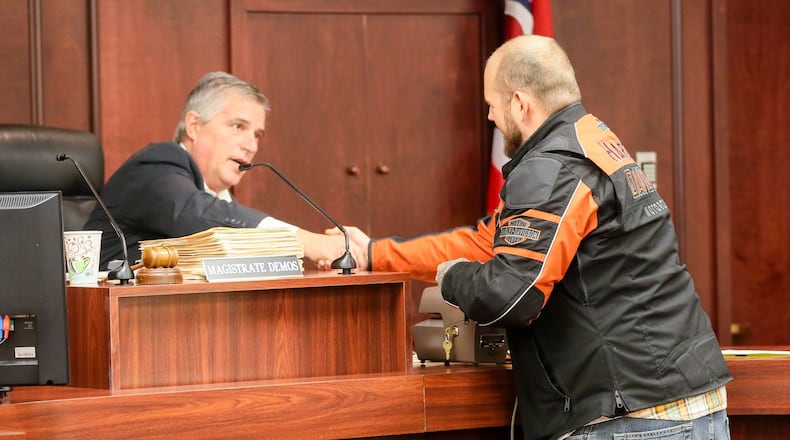Up to 80% of cases that come before Xenia Municipal Court involve drugs or alcohol in some way, Xenia Municipal Court Judge David McNamee previously told the Dayton Daily News.
The ultimate goal of the specialized docket is to reduce recidivism, and to help people get back on their feet.
“I’m proud of the court, and I’m proud of the probation department,” McNamee said Thursday. “I hope it’s something that other courts in our country look at as being a viable resolution for people who deal with addiction that come through our courts.”
Once an offender is arraigned for a drug-related crime, court staff may refer the individual to the drug court program.
The court then works with local mental health care providers and the specialized docket judge to create a treatment plan for the person, which may include inpatient or outpatient treatment, counseling, and later opportunities for education or job training.
While the offender is in addiction recovery, they will appear before McNamee every week, then every two weeks, and so on, until they graduate from the program entirely.
Other organizations continue to provide education, job training opportunities, and housing assistance after participants complete the drug court.
“If we get this rehabilitated person to a point they’ve got, six, nine, 12 months of sobriety, and then we just cut them loose, well, all we’ve done is kept them clean for a year and set them up for failure,” McNamee said. “And so that’s where the community services come in, as far as helping out with living expenses, employment training, things of that nature.”
Individuals who are eligible for the drug court are predominantly those with non-violent offenses. While violent and felony cases can be referred to the drug court, they are much more rare and come with restrictions, McNamee said.
If an individual chooses not to go through with the drug court, they would enter a guilty plea to the initial charge, and then go through a more traditional sentencing process, McNamee said.
Relapse, however, does not equate to expulsion.
“It used to be that a relapse was viewed as failure. Now, it’s kind of viewed as more of a part of the process,” he said. “Nobody wakes up in the morning says, ‘This is where I want my life to go.’ So if we can restore hope in the individual and get them reintegrated back into society, not only does that person stop using and stop committing crimes, not have any recidivism, they’re a message to everybody they come in contact with who knew them from before.”
Xenia Municipal Court has jurisdiction for the cities of Xenia and Bellbrook, the villages of Yellow Springs, Cedarville, Spring Valley and Bowersville, and 10 Greene County townships.
As of last December, there are about 5,800 Ohioans served by more than 260 specialized dockets, according to the Ohio Supreme Court.
“You get to that point where you have such low self-esteem, you don’t think that you’re worth anything. You don’t think anybody cares about you,” McNamee said. “My message would be don’t ever give up on yourself. And know that you’re worth it. That’s something that I tell my defendants all the time.”
About the Author


